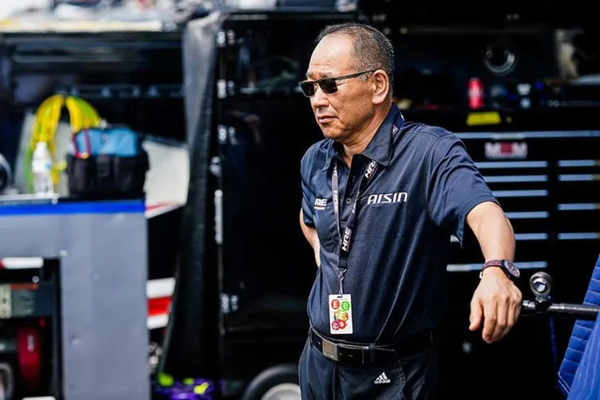

How did a former Formula Toyota champion from Okayama, Japan, rise to prominence as one of NASCAR’s most subtly significant players in the American Midwest? Shigeaki Hattori sat by himself on a pit wall at Homestead-Miami Speedway in 1999, his helmet in hand, wondering if he had just finished his final race in the U.S. Open-wheel. He was pushed out by politics, his sponsorship negotiations were hindered by language barriers, and his NASCAR dreams, which were barely a whisper at the time, seemed laughably far off. Hattori, however, did not leave. Rather, he changed the rules for what it means to be persistent internationally in American motorsports.
Twenty years later, the same man who was once written off as an outsider now owns one of the NASCAR Craftsman Truck Series’ most prestigious teams. Hattori Racing Enterprises survived in more than just a competitive sport. Brett Moffitt won a national title in 2018 and has been upending the status quo ever since. But in a sport characterized by ovals, roots, and regional allegiance, how did Hattori move from being a little-known road racer to becoming a championship-winning owner? The solution is found in a tale of triumph, cultural fusion, silent perseverance, and one man’s will to keep going when all the doors were slammed shut.
ADVERTISEMENT
Article continues below this ad
Who is Shigeaki Hattori?
Japanese race car driver and team owner Shigeaki “Shige” Hattori is well-known for his contributions to motorsports in both Japan and the US. Hattori, who was born in Okayama, Japan, on November 3, 1963, started racing karts before moving on to Japanese Formula 2 and Formula 3. He moved to the United States in 1995 to pursue his racing goals after winning the Formula Toyota title in 1994.
Shigeaki Hattori joined the Indianapolis Lights Series in the United States and won two races there in 1998. After making it to the CART series in 1999, he went on to compete in the Indianapolis 500 in 2002 and 2003 as a member of the Indy Racing League.
The IMSA family is saddened to learn of the passing of Shigeaki Hattori. Our paddock knew him as a race-winning team owner in IMSA Michelin Pilot Challenge, but he also had an extraordinary career as a driver and team owner across several different racing disciplines. We join our… pic.twitter.com/ra0AAZelST
— IMSA (@IMSA) April 7, 2025
Hattori turned his attention to team ownership after retiring from racing, and in 2008, he established Hattori Racing Enterprises (HRE). Hattori made a lasting impression on the motorsports community and was praised for his unwavering determination, spirit of competition, and distinct sense of humor.
Trending
What’s your perspective on:
Did Shigeaki Hattori's journey redefine what it means to be an outsider in American motorsports?
Have an interesting take?
From winning the Formula Toyota Championship to NASCAR, Shigeaki Hattori’s racing exploits
Instead of making a big splash when he entered American motorsports, Hattori brought a championship trophy and an unbridled drive to succeed.
Hattori realized he would have to pursue his dreams overseas if he wanted more after winning the Formula Toyota title in 1994. The United States beckoned with fierce competitiveness rather than with open arms. He would be starting from a disadvantage due to a lack of major sponsorship, cultural differences, and language barriers. Nevertheless, he packed his bags and traveled to America in 1995, intending to become well-known outside of his native nation.
In the Indy Lights Series, he established himself thanks to his aggressive style and road-course accuracy. Shigeaki Hattori’s next leap—to CART and eventually the Indianapolis 500—exposed the cost of chasing opportunity without steady support, but his two victories in 1998 demonstrated his belonging. After a DNQ here and a mechanical failure there, his open-wheel trajectory quickly started to wane. The majority of drivers would have gone home or quietly quit racing. Hattori didn’t.
Rather, he turned to stock car racing, something that very few drivers from other countries dare to try.
A remarkable career path Shigeaki Hattori walked. @INDYNXT race winner and two-time Indianapolis 500 starter behind the wheel before moving to #NASCAR team ownership, ultimately winning the 2018 @NASCAR_Trucks championship. Godspeed, Shige. pic.twitter.com/P2pcoaNSdy
— David PeQueen (@CarSDS2078) April 7, 2025
Few people recognized his name, and even fewer expected anything from him when he made his way into the NASCAR Craftsman Truck Series by 2004. Despite his modest driving accomplishments, Shigeaki Hattori’s next chapter focused on creating something greater rather than driving. Although his driving years weren’t particularly illustrious, they were life-changing. For someone like him to thrive in a sport that was not designed for outsiders, they showed him where the cracks were, how to go through them, and what type of team structure was required.
Hattori’s journey through Formula Toyota, Indy Lights, CART, and NASCAR was essentially a roadmap for the empire he would eventually create as an owner rather than a string of unconnected stops. And from Suzuka to Charlotte, each lap he completed moved him one step closer to the unlikely title he would one day win—not for himself, but for the racers of the future who only needed someone to believe in.
Is Shigeaki Hattori related to Naoki Hattori?
Naoki Hattori has no relationship to Shigeaki. Numerous sources attest to the fact that they are not related, even though they have the same last name and are both Japanese race car drivers who participated in comparable series.
Shigeaki Hattori is tasting success as the team owner of Hattori Racing Enterprise
As the owner of Hattori Racing Enterprises (HRE), former Japanese race car driver Hattori achieved remarkable success. Under Hattori’s direction, HRE, which was established in 2008, won 14 races in the NASCAR Craftsman Truck Series. The team’s greatest achievement occurred in 2018, when driver Brett Moffitt won the Truck Series championship, which was a major turning point in Hattori’s and HRE’s careers.
Shigeaki Hattori’s dedication to motorsports was evident in his move from driver to team owner. During his time in the IndyCar Series, his best result was sixth place at Texas Motor Speedway. Before quitting as a driver in 2005, Hattori made his NASCAR debut in 2004 and competed in the Truck Series for two seasons. His continued love of racing resulted in the founding of HRE. Hattori’s status in the NASCAR community was cemented when the team’s tenacity paid off in the 2018 victory.
The Racing world mourns the untimely demise of Shigeaki Hattori
Shigeaki “Shige” Hattori died in a traffic accident on NC Highway 73 in Huntersville, North Carolina, at approximately 9:15 a.m. on Saturday, April 5, 2025. According to the Huntersville Police Department, Hattori’s Toyota Crown crossed the center line for unknown reasons and collided with an oncoming Lexus ES. Hattori was pronounced dead at the scene, while the driver of the Lexus sustained non-life-threatening injuries. The investigation remains ongoing, but authorities have stated that neither speed nor impairment is believed to have played a role in the crash.
Shigeaki Hattori started his racing career in Japan, where he won the Formula Toyota title in 1994. After relocating to the US in the middle of the 1990s, he participated in the Indianapolis Lights Series and then the Indianapolis Racing League, making two starts at the Indianapolis 500. Before retiring as a driver, Hattori joined NASCAR and competed in the Craftsman Truck Series in 2004 and 2005. Hattori established Hattori Racing Enterprises (HRE) in 2008, and the NASCAR Craftsman Truck Series saw considerable success with HRE. HRE won 14 races under his direction, including a championship with driver Brett Moffitt in 2018.
ADVERTISEMENT
Article continues below this ad
— Hattori Racing (@Hattori_Racing) April 7, 2025
NASCAR released a statement honoring Hattori:
ADVERTISEMENT
Article continues below this ad
“Shigeaki Hattori was a passionate racer and highly successful team owner, but beyond all his team’s statistics — which includes a NASCAR Truck Series championship — Shige was a genuine, beloved member of the garage who worked tirelessly to lift our sport and his people… We are deeply saddened by his tragic passing. NASCAR extends its thoughts and prayers to his family and many friends.”
Coworkers, fans, and the larger motorsports community will all mourn Hattori greatly because of his commitment and contributions, which have made a lasting impression on the racing industry.
ADVERTISEMENT
ADVERTISEMENT
ADVERTISEMENT
ADVERTISEMENT







Did Shigeaki Hattori's journey redefine what it means to be an outsider in American motorsports?